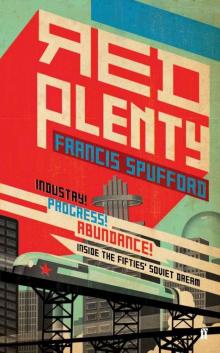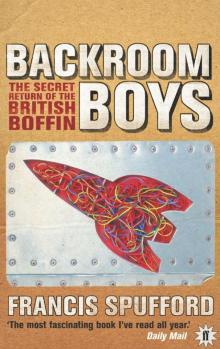- Home
- Francis Spufford
Red Plenty Page 3
Red Plenty Read online
Page 3
3 The slogan advertised Soviet Champagne: it had begun as a comment by Stalin (naturally) to a meeting of combine-harvester drivers on 1 December 1935 – ‘Everybody now says that the material situation of the toilers has considerably improved, that life has become better, more cheerful’ – and then been pressed into service in songs, speeches, posters, newspaper banner headlines. See Fitzpatrick, Everyday Stalinism, p. 90 and note; for Soviet Champagne, see Jukka Gronow, Caviar with Champagne: Common Luxury and the Ideals of the Good Life in Stalin’s Russia (Oxford: Berg, 2003).
4 On his professor suit would have been a cotton star: for Jewish experiences of the USSR in the 1930s, and Jewish perceptions of it as a place of philosemitic enlightenment and opportunity, see Yuri Slezkine, The Jewish Century (Princeton NJ: Princeton University Press, 2004).
5 A request from the Plywood Trust of Leningrad: I have imagined the details of the approach to Kantorovich, but the origin of his mathematics of optimisation in the Plywood Trust’s commission is absolutely authentic. When Kantorovich was celebrating his seventieth birthday in 1982, he was presented with a piece of plywood on which was inscribed ‘I am a simple plank, but I too am rejoicing, because it all began with me’. The first publication of his method, proving his priority as discoverer, was in a sixty-eight-page pamphlet of 1939, Matematicheskie metody organizatsii i planirovaniya proizvodstva (‘Mathematical methods of production management and planning’), and his university also organised a small conference; but very little notice was taken officially, which was probably the safest outcome for him, and it is not even clear whether the Plywood Trust used what he had presented to them: quite possibly not. The method was then independently reinvented in the United States by Tjalling Koopmans and by George Danzig, who while working on transport and allocation problems for the US Airforce during the war coined the phrase ‘linear programming’. Koopmans’ formulation had one difference from Kantorovich’s: it assumed that any maxtio selection of outputs would count as efficient, whereas for Kantorovich the selection was a given. It came from the planners, and there was only one of it to maximise. See Michael Ellman, Planning Problems in the USSR: The Contribution of Mathematical Economics to Their Solution 1960–1971 (Cambridge: CUP, 1973).
6 He had seen a method which could do what the detective work of conventional algebra could not: the Plywood Trust had in effect presented him with a group of equations to solve of the form 3a + 2b + 4c + 6d = 17, where the unknown variables a, b, c, d stood for the unknown assignments of work between different machines – only with many, many more variables than just these four. These are known as ‘linear’ equations, because if graphed they produce straight lines, and it is a property of linear equations that you can only solve them if you have as many equations to work with as there are variables. Otherwise, they are ‘undetermined’ – there are an infinite number of possible solutions, and no way to decide between them. The Plywood Trust’s equations were undetermined, since there were fewer of them than the immense number of variables they wanted to know. Kantorovich’s first step was to realise that he had a criterion for choosing between the infinite solutions, in the knowledge that a + b + c + d, the total amount of work done by the machines, was to be minimised for the production of the target output of plywood in the Plywood Trust’s plan. Or you could turn the problem around, and see yourself as maximising the output target. For a textbook explanation of linear programming, adapted to American business-school students, see Saul I. Gass, Linear Programming: Methods and Applications (NewYork: McGraw-Hill, 4th edn, 1975).
7 Skyscrapers in Manhattan, and the promise of more in Moscow: for the promise of the Stalinist future, see Lev Kopelev, The Education of a True Believer (New York, 1980), quoted in Fitzpatrick, Everyday Stalinism, p. 18; for specifically architectural visions of the future, see the website Unrealised Moscow, www.muar.ru/ve/2003/moscow/index_e. htm, a gathering of the kind of images whose hypnagogic power, taken collectively, is horribly well realised in Jack Womack, Let’s Put the Future Behind Us (New York: Atlantic Monthly Press, 1996).
8 An extra 3% year after year, compounded: in an economy that consumed all the goods it produced, the 3% of extra output Kantorovich anticipates here would only have contributed a simple boost to production, not a compounding addition to the growth rate. But in an economy that partially re-invested its productive output in further productive capacity, the 3% extra growth would indeed have compounded – and the Soviet economy of the 1930s was exceptional in the degree to which it reinvested, rather than consuming, its production.
2.
Mr Chairman, 1959
Such a long journey. It was hard to sleep in the cutting roar of the turboprops, hard to sleep too with a headful of anticipations and anxieties, but he dozed in the end, the noise following him somehow into the kinm on the far side of oblivion, still pulsing and beating in his ears as he hurried from room to room of a half-finished palace, constructed (he was glad to see) using the large-panel method he had recommended in his speech on architecture; and when he woke, the bright light of a morning high above the Atlantic was pouring in through the window of the airliner, making his eyeballs ache. He blinked, and tugged at his waistband. The vinyl seat had grown sticky. Around him, the entourage stirred into life as well, shifting to attention when they noticed that his eyes were open. But he did not need anything. The preparations were all done. Nina Petrovna, beside him, did not move, yet he knew that if he turned his head he would find her ready to hear whatever was on his mind, as she had been gravely ready their entire married life, knowing the importance of his work: at every midnight, at every dawn, in the middle of any family situation. He bent towards the window, and flattened his cheek against the cold glass to get a downward view. A few whitecaps were shrugging in and out of existence on a wide grey sea. A little black dot was tossing among them, and another was visible in the distance up ahead, along the line of the plane’s flight: the trawlers, he supposed, strung out across the sea by security when he told them he didn’t want the navy deployed.
‘How much longer?’ he asked.
‘Still about an hour to the Canadian coast, Nikita Sergeyevich, and then two more after that to Washington,’ said young Troyanovsky the interpreter, eagerly. He was a good boy, almost American-looking himself in his buttoned-down shirt collar, and you could tell he wanted the work to start, so he could show what he was made of. That was a good attitude, he thought. Not much different from me, he thought. He rubbed his eyes and gazed up the plane. The engines sang out the same obliterating music. Along the aisle the lads from the Tupolev bureau were still intently listening to it through their headphones, crouched over an electrical box that had been explained to him as a kind of stethoscope for aeroplanes. They did not seem to be worried by what they were hearing in the twining streams of noise. But then he did not really see what they would be able to do if the remote chance they were guarding against came true, if the plane did suddenly crack at the seams in mid-air. The sky would be full of falling generals and diplomats, and him in the midst of them, plummeting to the waves in his summer suit, like a lead-weighted Easter egg. ‘We’re sure of the TU-114, as sure as we can be,’ Tupolev himself had told him. ‘It’s just that it’s a new design, we’re still shaking it down, and we’ve had some readings from the airframe we weren’t expecting. That’s why I’d like to send my son along, with your permission, to keep an eye on things.’ ‘That isn’t necessary,’ he’d replied. ‘People will think he’s some sort of hostage!’ ‘Oh, no question of that, Nikita Sergeyevich. I just want to show you that we have confidence in the plane.’ The plane was bigger than any passenger jet the Americans had. The plane was irresistible. And so Tupolev junior had come along for the ride – and there he was with the other technicians now, feeling the drowsy gaze resting on him; and looking up; and clearly not knowing what expression he should hoist hastily onto his face. He didn’t blame him. What was the right demeanour for someone who was not-a-hostage? Especially since, to tell the truth,
the boy would have been a hostage in this situation, or at least a surety, just a few years ago. He frowned. Tupolev’s son instantly dropped his eyes.
Such a long journey. Such a long way travelled, he thought, since he had been a quick kid himself, the kid on the coalfield with the home-made motorbike and three gold roubles in his pocket on a Friday, and the fluffy white duckdown hair. (That hadn’t lasted long.) Such a long journey to this point in time for the whole country; and none of it easy, none of it achieved without cost. No one gave us this beautiful plane. We built it ourselves, we pulled it out of nothing by our determination and our strength. They tried to crush us over and over again, but we wouldn’t be crushed. We drove off the Whites. We winkled out the priests, out of the churches and more important out of people’s minds. We got rid of the shopkeepers, thieving bastards, getting their dirty fingers in every deal, making every straight thing crooked. We dragged the farmers into the twentieth century, and that was hard, that was a cruel business and there were some hungry years there, but it had to be done, we had to get the muck off our boots. We realised there were saboteurs and enemies among us, and we caught them, but it drove us mad for a while, and for a while we were seeing enemies and saboteurs everywhere, and hurting people who were brothers, sisters, good friends, honest comrades. Then the Fascists came, and stamping on them was bloody, nobody could call what we did then sweetness and light, wreckage everywhere, but what are you going to do when a gang of murderers breaks into the house? And the Boss didn’t help much. Wonderful clear mind, but by that time he was frankly screwy, moving whole nations round the map like chess pieces, making us sit up all night with him and drink that filthy vodka till we couldn’t see straight, and always watching us: no, I don’t deny we went wrong, in fact if you recall it was me that said so. But all the while we were building. All the while we were building factories and mines, railroads and roads, towns and cities, and all without any help, all without getting the say-so from any millionaire or bigshot. We did that. We taught people to read, we taught them to love culture. We sent tens of millions of them to school and millions of them to college, so they could have the advantages we never had. We created the boys and girls who’re young now. We did the dirty work so they could inherit a clean world.
And now was the time when it all paid off, he thought. The wars were over, the enemies were gone, the mistakes were rectified. Forty-two years since the revolution, and at last the pattern of the new society was established. All the young people had known no other way of living. They had never seen a rich man going past in his carriage; they had never seen a private shop. And so at last it was becoming possible to make good on all the promises which they’d fed to people during the hungry years. All well and good, he thought, because we really meant them, we weren’t trying to hoodwink anyone, but there’s a limit to how long you can keep going on that kind of diet. You can’t make soup out of promises. Some comrades seemed to think that fine words and fine ideas were all the world would ever require, that pure enthusiasm would carry humanity forward to happiness: well excuse me, comrades, but aren’t we supposed to be materialists? Aren’t we supposed to be the ones who get along without fairytales? If communism couldn’t give people a better life than capitalism, he personally couldn’t see the point. A better life, in a straightforward, practical way: better food, better clothes, better houses, better cars, better planes (like this one), better football games to watch and cards to play and beaches to sit on, in the summertime, with the children splashing about in the surf and a nice bottle of something cold to sip. More money to spend – or else more of a world in which money was no longer necessary to ration out the good things, because there were so many good things, all gushing out of the whatchamacallit, the thing like a cone spilling over with fruit. The horn of plenty. Fortunately, the hard part of the task was nearly done. They had almost completed the heavy liftingrs were ov had heaved and shoved and (yes) driven people on with kicks and curses, and they had built the basis for the good life, their very own horn of plenty pouring forth the necessary steel and coal and electricity. They had done the big stuff. All that remained was to get the small stuff right. It was time to use what they had built to make life a pleasure instead of a struggle. They could do it. If they could produce a million tons of steel, they could produce a million tons of anything. They just had to concentrate on directing their horn of plenty so that, as well as spitting out girders, it now also overflowed with musical boxes. Now the sacrifices ended. Now came the age of cream and dumplings: the old dream of a feast that never had to end, but truly delivered, delivered in sober daylight, by science.
It had already begun to happen, in his opinion. If you looked at people on the street, all the old clothes had vanished, in the last few years. No more patches, no more darns. Everyone was wearing fine new outfits. The children had winter coats no one had worn before them. People had wristwatches on their arms, like his own good steel watch from the Kuibyshev plant. They were moving in their droves out of the horrible old communal flats, where four families shared a toilet and there were knife-fights over who used the stove, into pristine concrete apartment buildings. Of course, there was still a long way to go. No one knew that better than him. He saw the figures the economists prepared. A Russian worker still only earned around 25% of the average American income, even if you threw in the most generous allowance for all the things that cost money in America and came free in the Soviet Union. But he saw the other figures too, the ones showing that year after year this last decade the Soviet economy had grown at 6%, 7%, 8% every year, while the American one only grew 3% or so at best. He was not a man who was naturally excited by graphs, but he was excited by this one, when he understood that if the Soviet Union just kept growing at the same rate, propelled onward by the greater natural efficiency of central planning, the line of Soviet prosperity on the graph was due to cross the line representing American prosperity, and then to soar above it, in just under twenty years from now. He had seen victory on a sheet of cardboard. It was proven. It was going to happen. And this was the reason, deep down, why he had accepted President Eisenhower’s invitation, when some might have asked whether they were ready for the test that was waiting for them in America: not just the test of negotiating with the richest, strongest capitalist state on the planet, but the deeper test, the test of comparison. Were they ready to measure up the Soviet way against the American way? Were they ready to let the people see a little bit of the scale of the task that still lay ahead? In his opinion, if you believed that the good times were coming, if you trusted that graph, it was necessary now to behave like it. It was necessary to make an act of faith. The people had earned the right to a bit of trust. He had said yes to the American exhibition in Sokolniki Park, this year, because he trusted the Soviet citizens who were going to visit it. Let them see the best the Americans can do. Let them see what they’re competing with. Let them see what they’re going to get themselves, in not too long, and more besides. Let the dog see the rabbit. Let them feel a bit hungry for the future. Maybe they’d pick up some ideas. It was always good to learn from the Americans.
So, yes, he believed they were ready. Overtake and surpass, the Boss used to say, again and again. Overtake and surpass. The strategy was still the same. The difference was that now it was more than a goal. Now it was happening. Accordingly, he had a deal he was going to offer the Americans. He thought the Americans would take it. He didn’t see why they wouldnent. The deal was this. Since the great quarrel between capitalism and socialism was really an economic one, why not conduct it that way, instead of as a war? Why not handle it as a race to see who could do the best job at supplying the ordinary fellow on the beach with his cold drink? The two sides could co-exist while they competed. Everyone could step back from the guns (and the generals wouldn’t eat up so much of the state budget, which would be handy). History could move forward peacefully. Naturally, the capitalists believed their system was the best. Naturally – here was the beauty of it – the
y would expect to win the contest. So why wouldn’t they agree? All the capitalists had to do was to settle down and accept that the world was divided now, into two halves, one of which was not theirs any more. They just had to get used to the idea that Poland and China and Hungary and the rest had chosen in favour of a different way of life, and weren’t coming back. Sometimes the Americans seemed to take the point; sometimes, mysteriously, they didn’t. Take Nixon’s visit to Moscow two months back when the exhibition opened, for example. ‘Let’s compete on the merits of our washing machines, not the strength of our rockets,’ he’d said – the Vice President of the United States, Eisenhower’s own right-hand man! Perfect! Yet that very same week, when the right hand of the United States was held out in friendship, the left hand was making gestures which, forgive me, you couldn’t describe in polite company. That very same instant the United States Congress declared a ‘Captive Nations Week’, and started calling the Soviet Union a tyranny and its allies slaves. Well, that kind of insult would have to stop, if the Americans wanted peace. He was coming to America to offer peace, but it was up to the Americans whether they accepted it. It was up to them if they lifted their trade embargo. They were making a mistake if they expected him to bend the knee. He was not going to beg; no, never to beg.
Of course, the Boss would have hated the whole idea of this trip. The Boss had let them all know he thought he was the only one tough enough, clever enough, to go up against the owners of the world. ‘Without me, the capitalists will make mincemeat of you,’ he’d said. ‘Without me, they’ll drown you like kittens.’ ‘Oh, Nikita Sergeyevich,’ he’d said. ‘You try your best, but is your best good enough?’ He remembered the time the Boss had reached out his stumpy nicotine-stained finger in a meeting, in front of all the others, and tapped him three times hard between the eyes, like a woodpecker irritably sounding a tree. And the time the Boss had emptied the coals from his pipe on the top of his bald head, stinging hot; hotter still than that, the flush of his shame remembering it, remembering that, when it happened, he had believed the Boss had the right to do it, and had admired him no less. You’re over, you bastard, he told the remembered smile. Goodbye.

 Light Perpetual
Light Perpetual True Stories
True Stories The Child that Books Built
The Child that Books Built Golden Hill
Golden Hill Unapologetic
Unapologetic Red Plenty
Red Plenty Backroom Boys
Backroom Boys